Logistics
Logistics – a relatively new specialty, but quite in demand in the labor market. The logistics service has a close relationship with almost all divisions of the company. Logistic is a profession of the 21st century. The main functions of the logistician are working with customers and suppliers, preparing documents, systematizing them and creating registers. The logistician’s duties also include resolving organizational issues related to the formation and placement of an order, coordinating the work of the warehouse and the transport service, forecasting purchases with the sales department and laying out cargo routes, inventory management. In addition, the logistician must know foreign languages, be able to negotiate with contractors and drivers, and be able to correctly use information technologies in his work. A logistics professional must comprehensively represent all business processes, supply chains and find solutions for their rational optimization.
Speciality code: В11301
Academic degree: Bachelor in Services
Form of education: full-time, full-time with the use of remote technologies
Duration of study:
- 4 years after secondary education (full-time)
- 3 years after an average professional (full-time)
- 2 years after higher education
Logistics is the science of optimal management of discrete and continuous flows in the production of goods and services. Knowledge of logistics is the possession of the most important tool of competition. Profit and sustainable development of the company. “This is the true philosophy of thriving commercial activity”
The purpose of the educational program “Logistics” is to train competitive specialists in the field of logistics process management, professionally proficient in the principles and concepts of logistics activities, able to solve the problems of increasing the competitiveness of enterprises based on the use of modern logistics methods.
The uniqueness of the educational program “Logistics” consists in the practical orientation of the program, in the integration of business education and compliance with modern trends in logistics education. OP “Logistics” is relevant and popular in the labor market, it includes a list of the most popular professions of the twenty-first century.
On the basis of the Department of Marketing and Logistics, the National Certification Center for Logisticians of Kazakhstan and Central Asia, which is part of the European Logistics Association (ELA), has been opened since 2020. The Company creates one National Certification Center (NCC) in each country, in Kazakhstan it was created on the basis of the University “Turan”. Within the framework of the NCC, exams are held to confirm qualifications for the 3rd levels of certification: operational logistician; senior logistics; master of logistics. Appropriate programs, tests and own standards have been developed for each level of the system http://www.elalog.eu/accredited-programs-celog.
The educational program “Logistics” has been internationally accredited by the European Logistics Association (ELA) for three years with the right to issue certificates to successful students of this OP certificate of international standard in the field of logistics for 5 years, valid until March 19, 2024
Modern application programs are used such as: “1C ERP: Enterprise Management” on the 1C: Enterprise 8 platform and the possibility of passing certified international courses “1C ERP: Enterprise Management” in the following areas: warehouse management; provision planning
Successfully passed accreditation in the NAAR and “Accreditation, Certification and Quality Assurance Institute” (ACQUIN), in the ratings of the NAAR, “Atameken”
The educational program “Logistics” has been internationally accredited by the European Logistics Association (ELA) for three years with the right to issue certificates to successful students of this OP certificate of international standard in the field of logistics for 5 years, valid until March 19, 2024
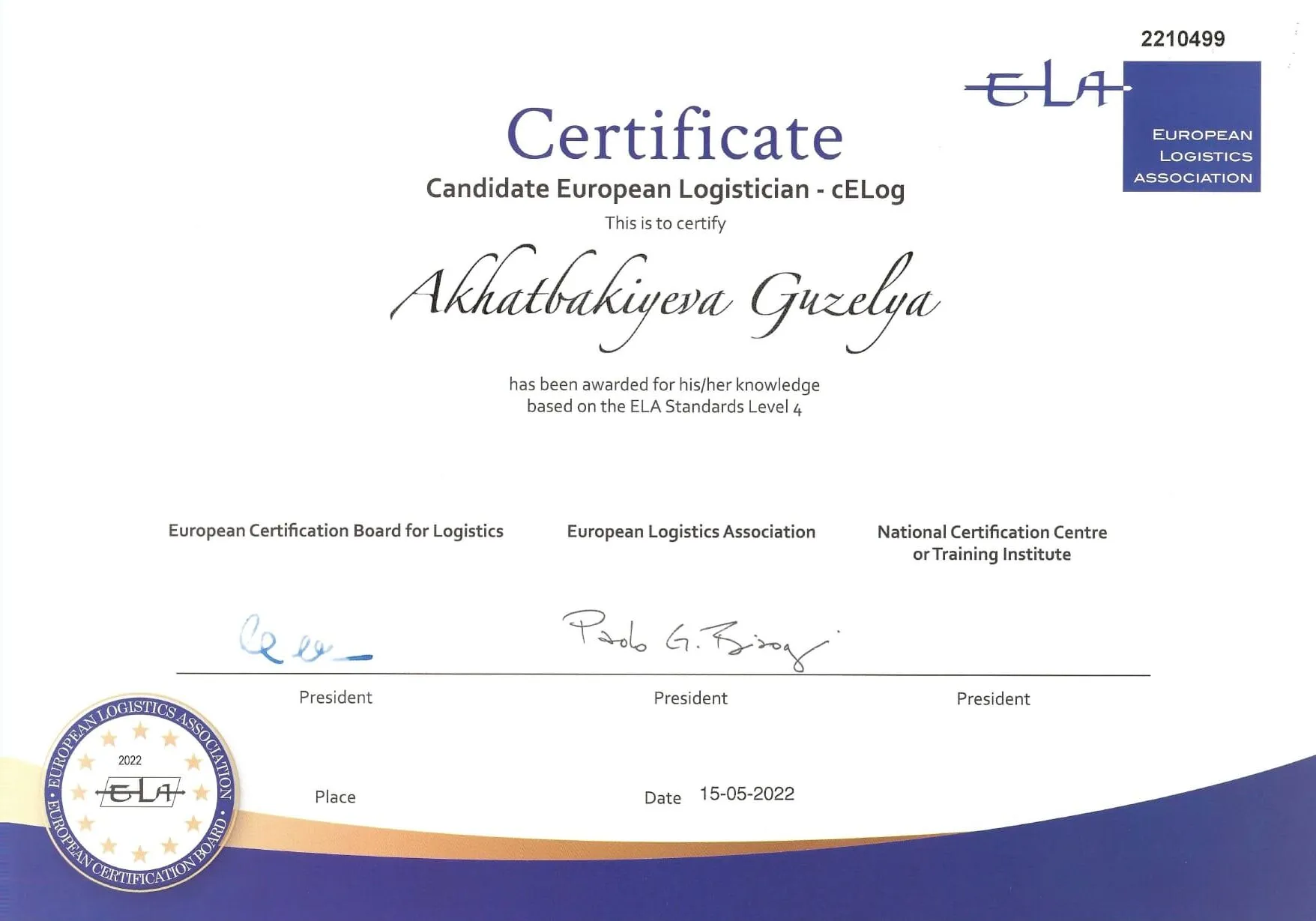
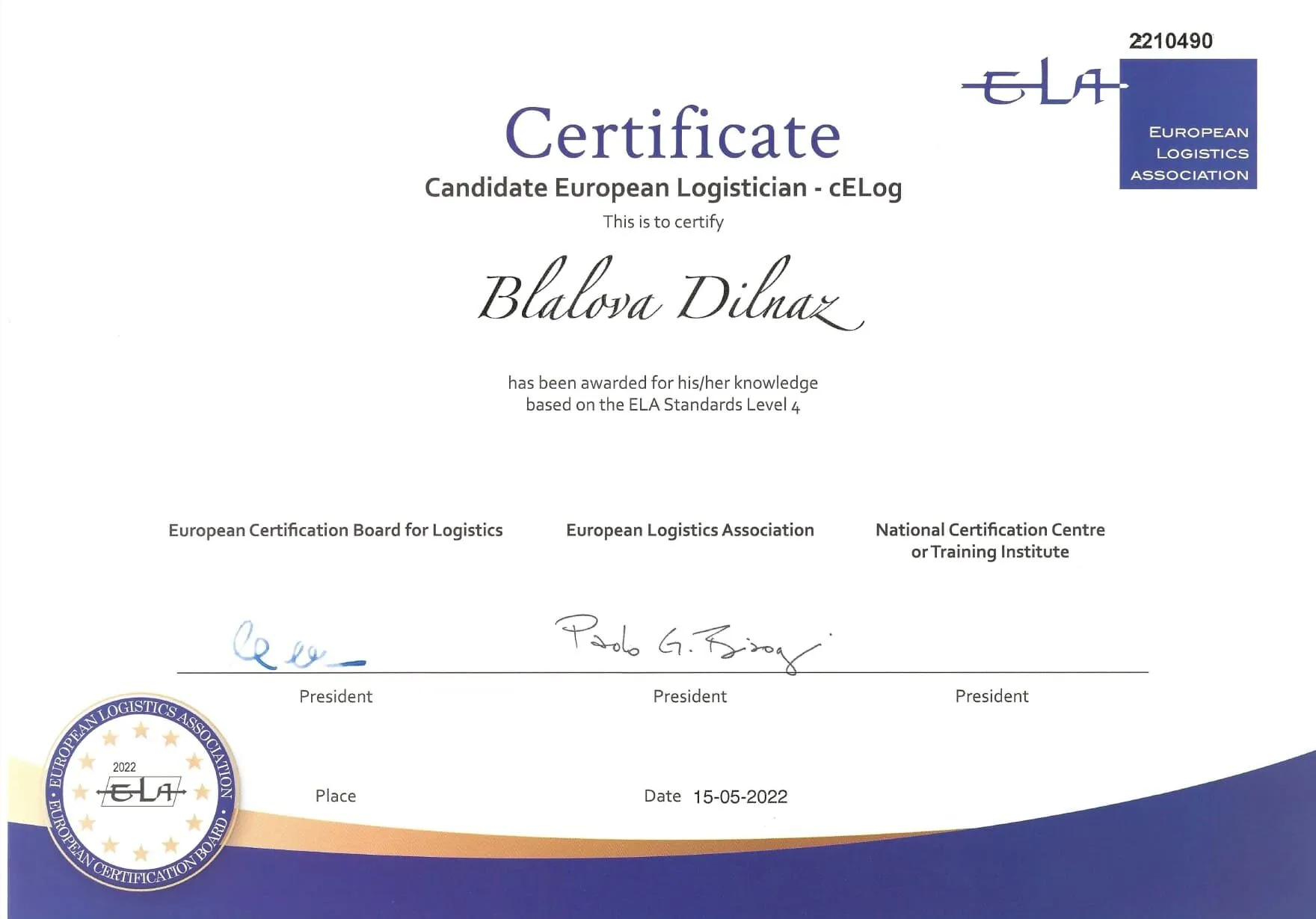
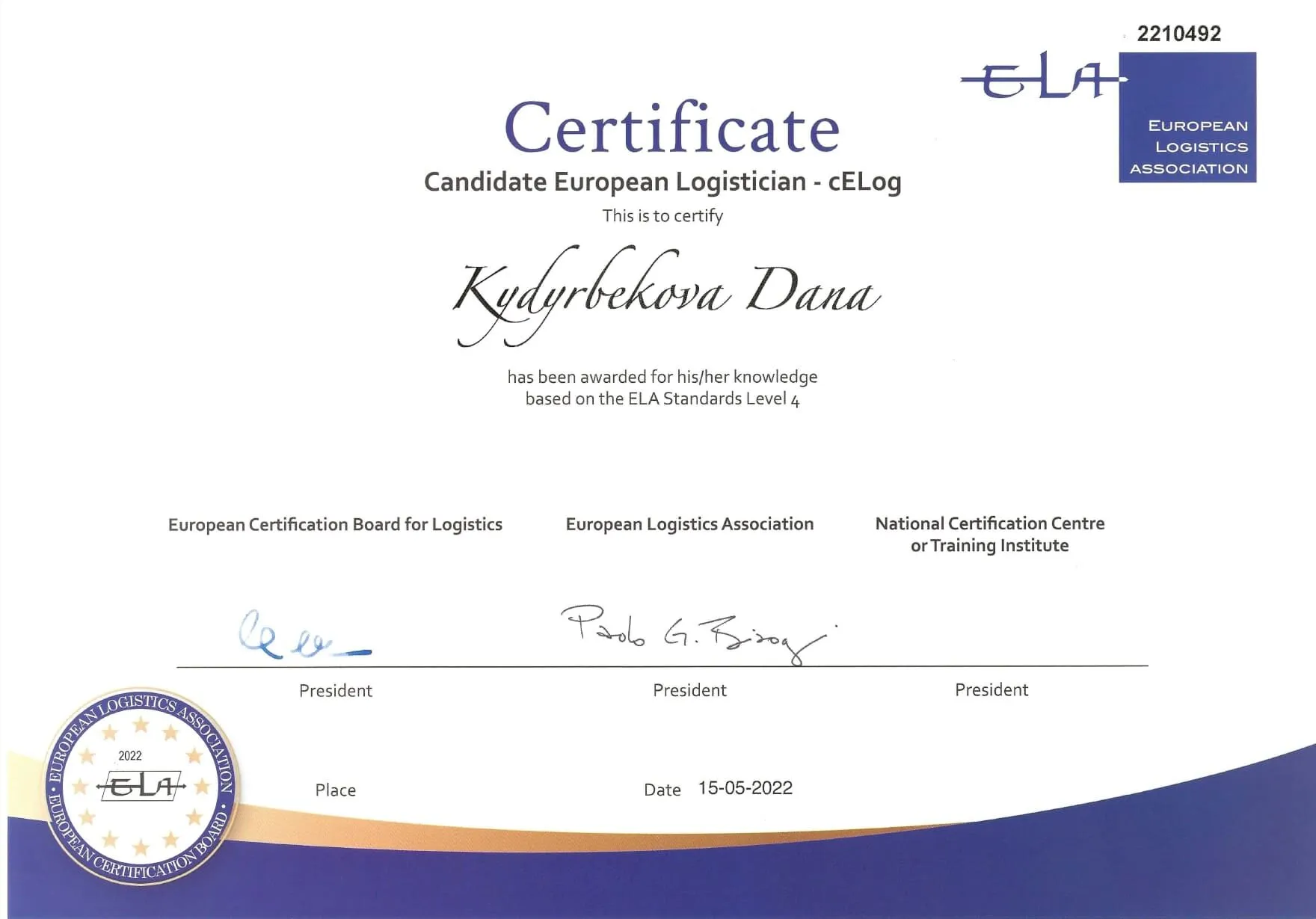
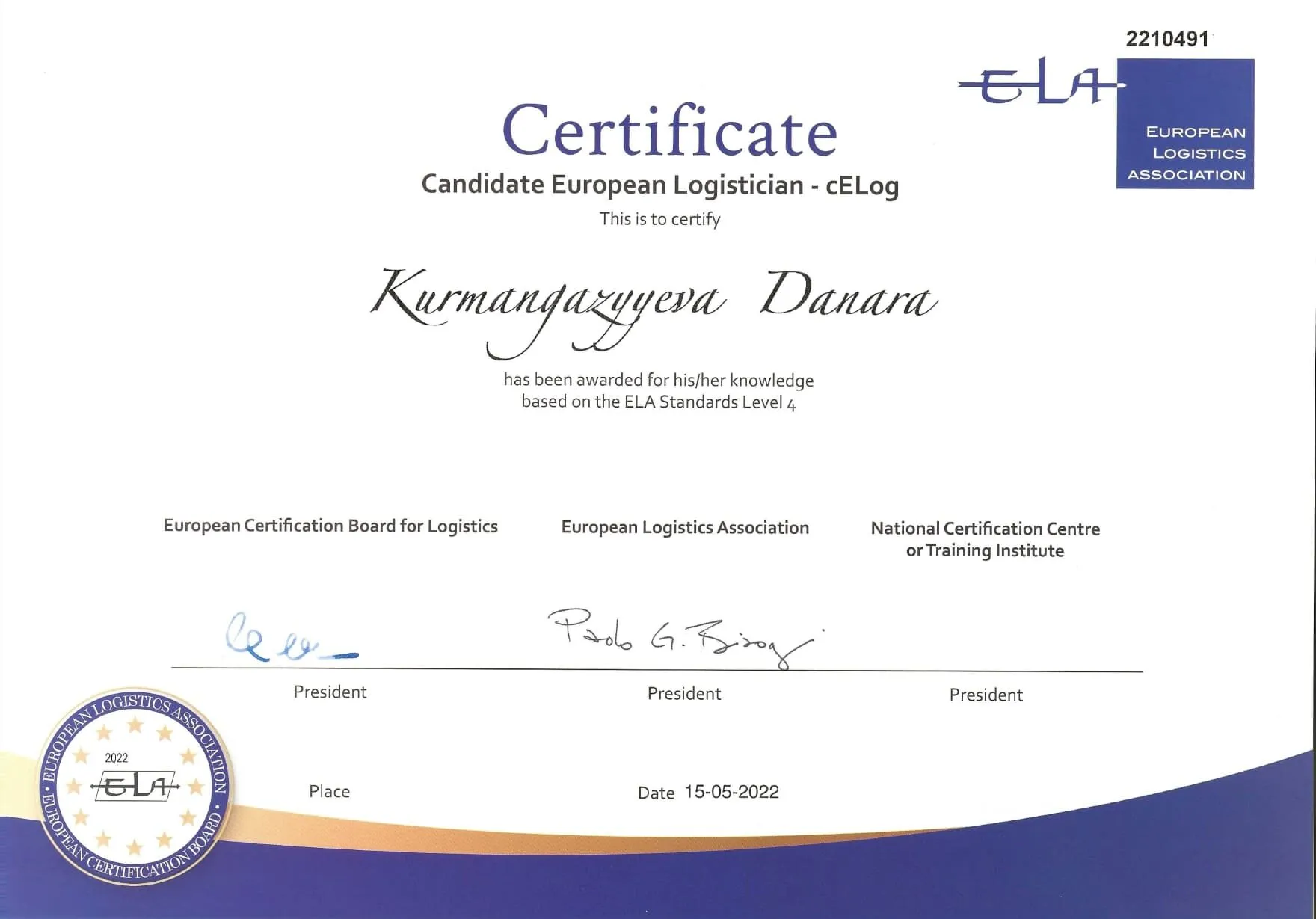
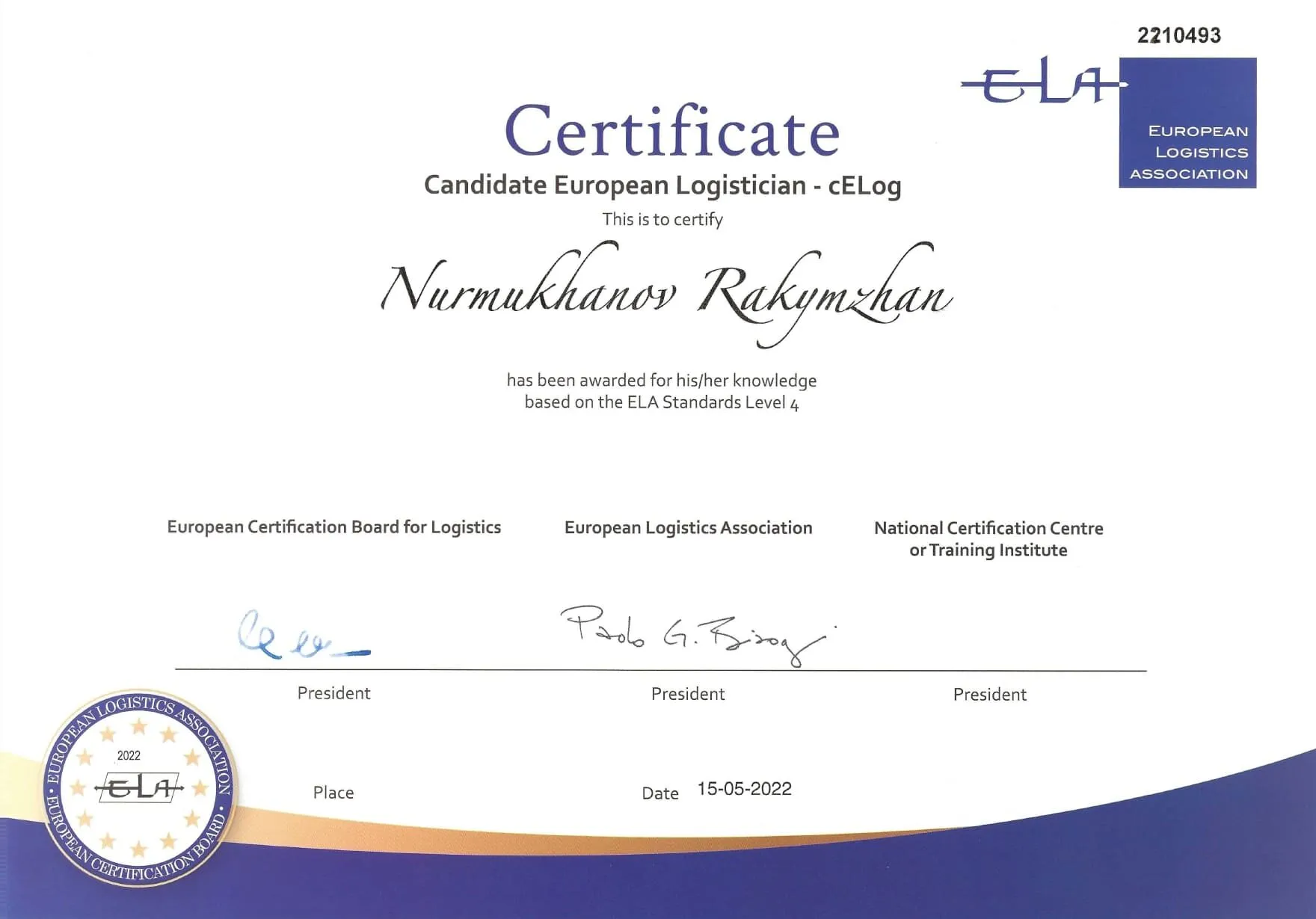
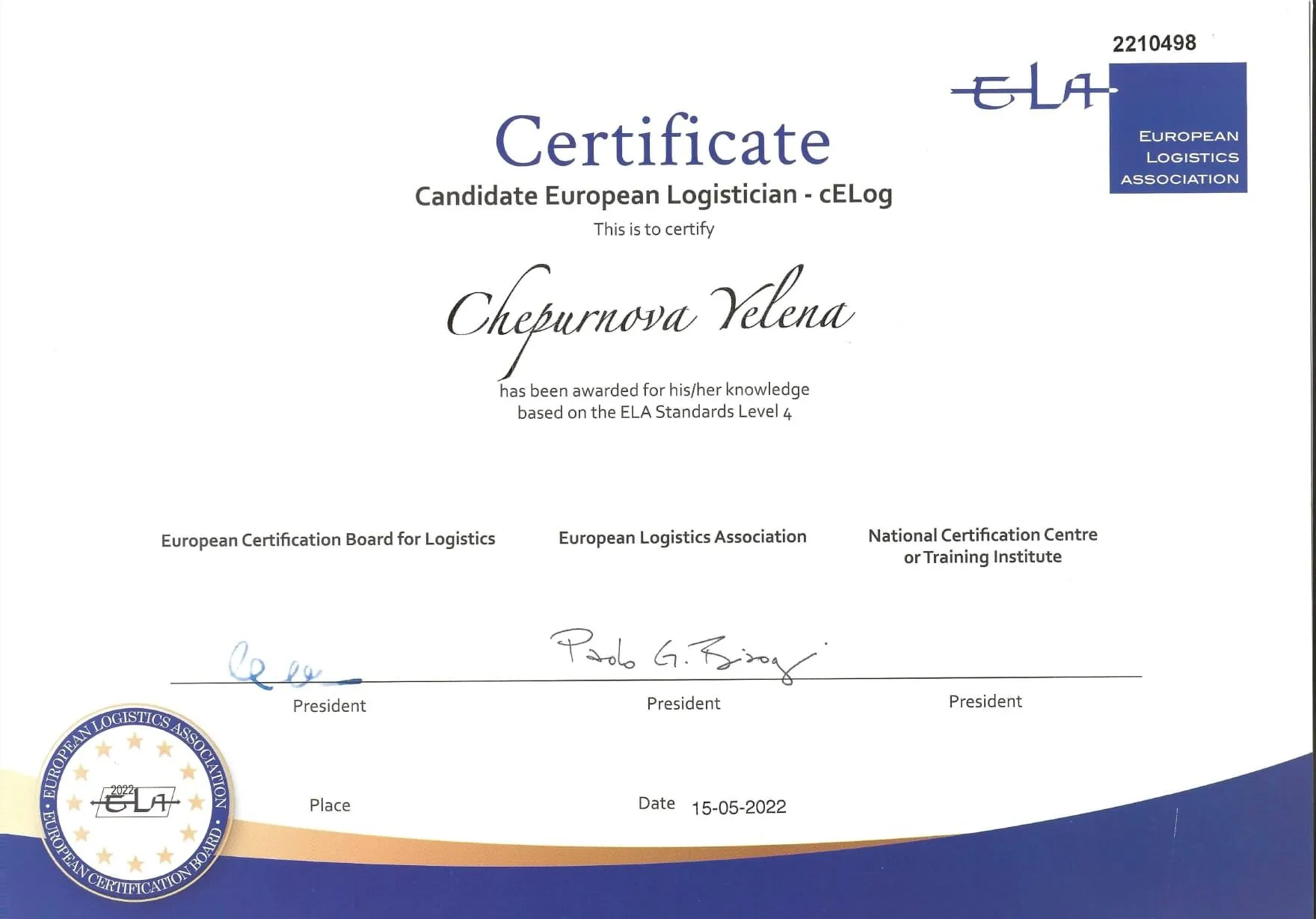
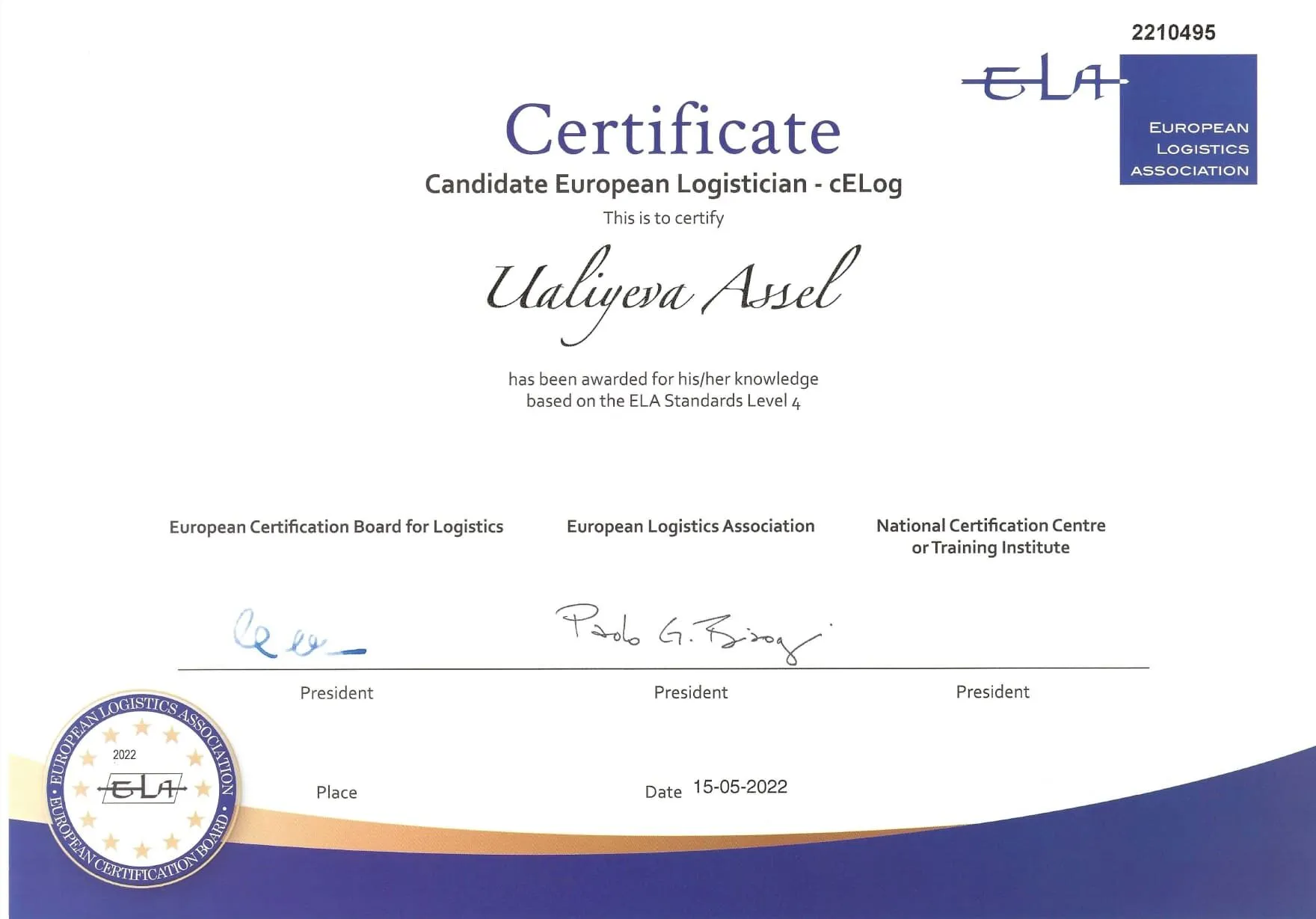
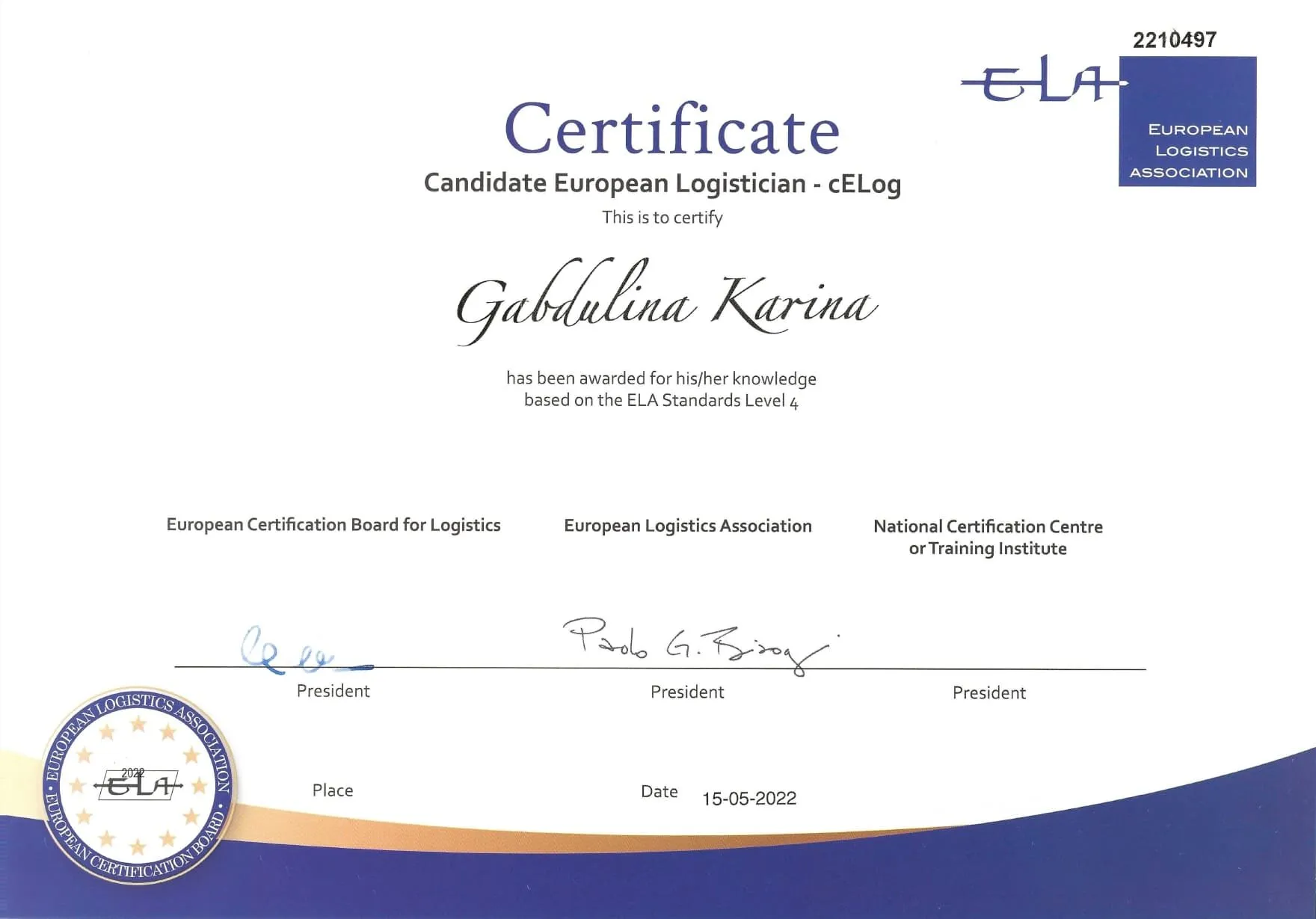
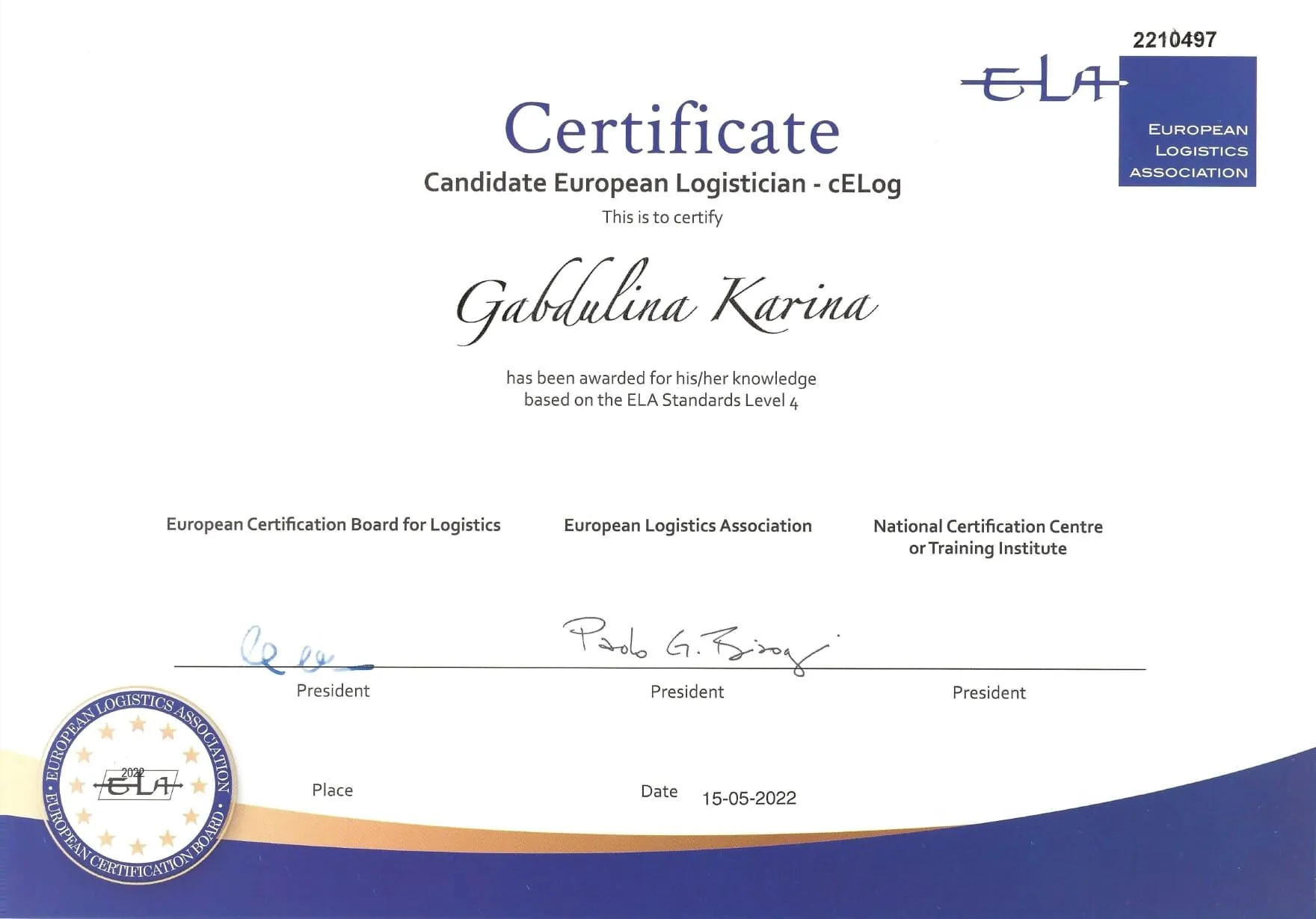
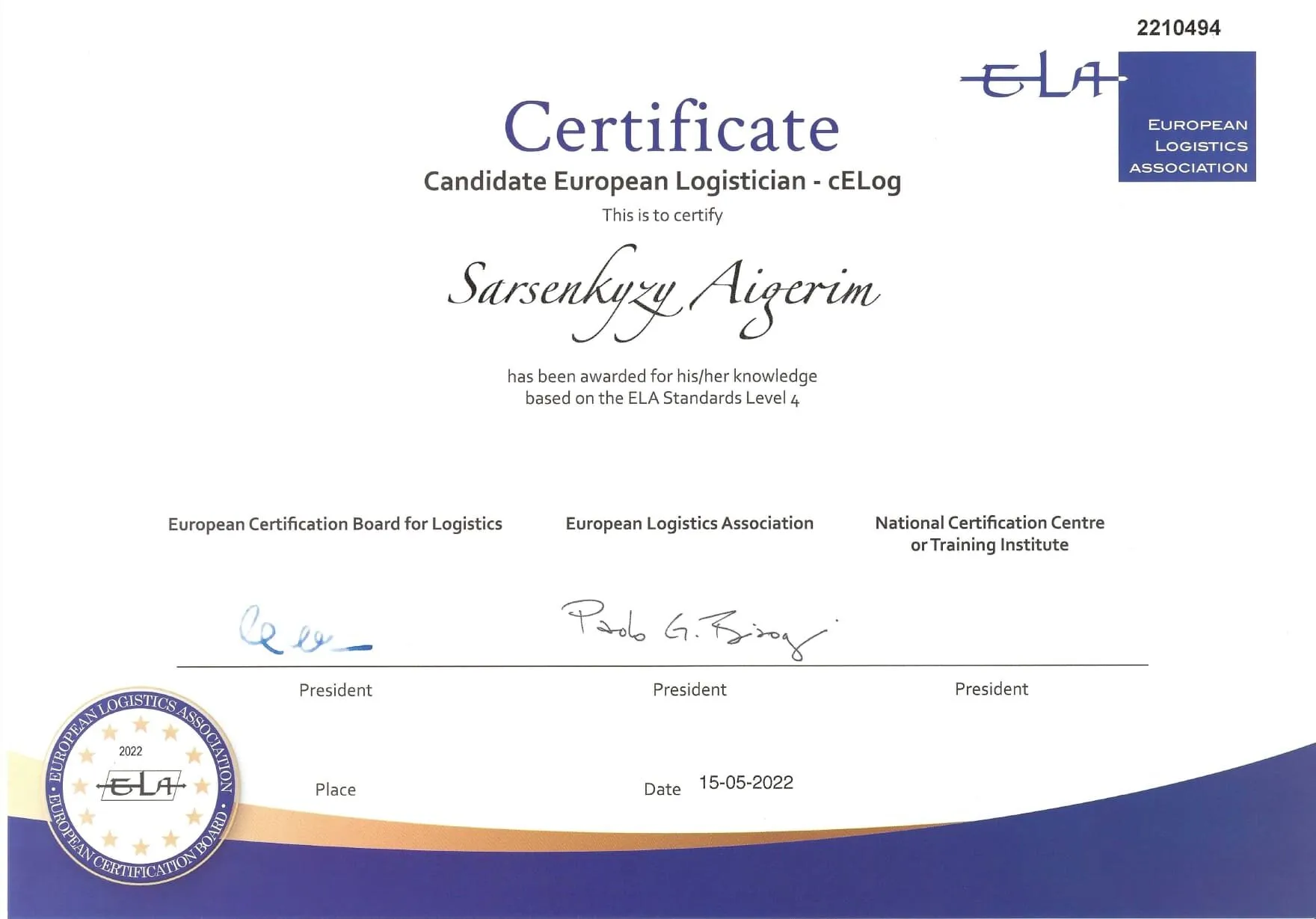
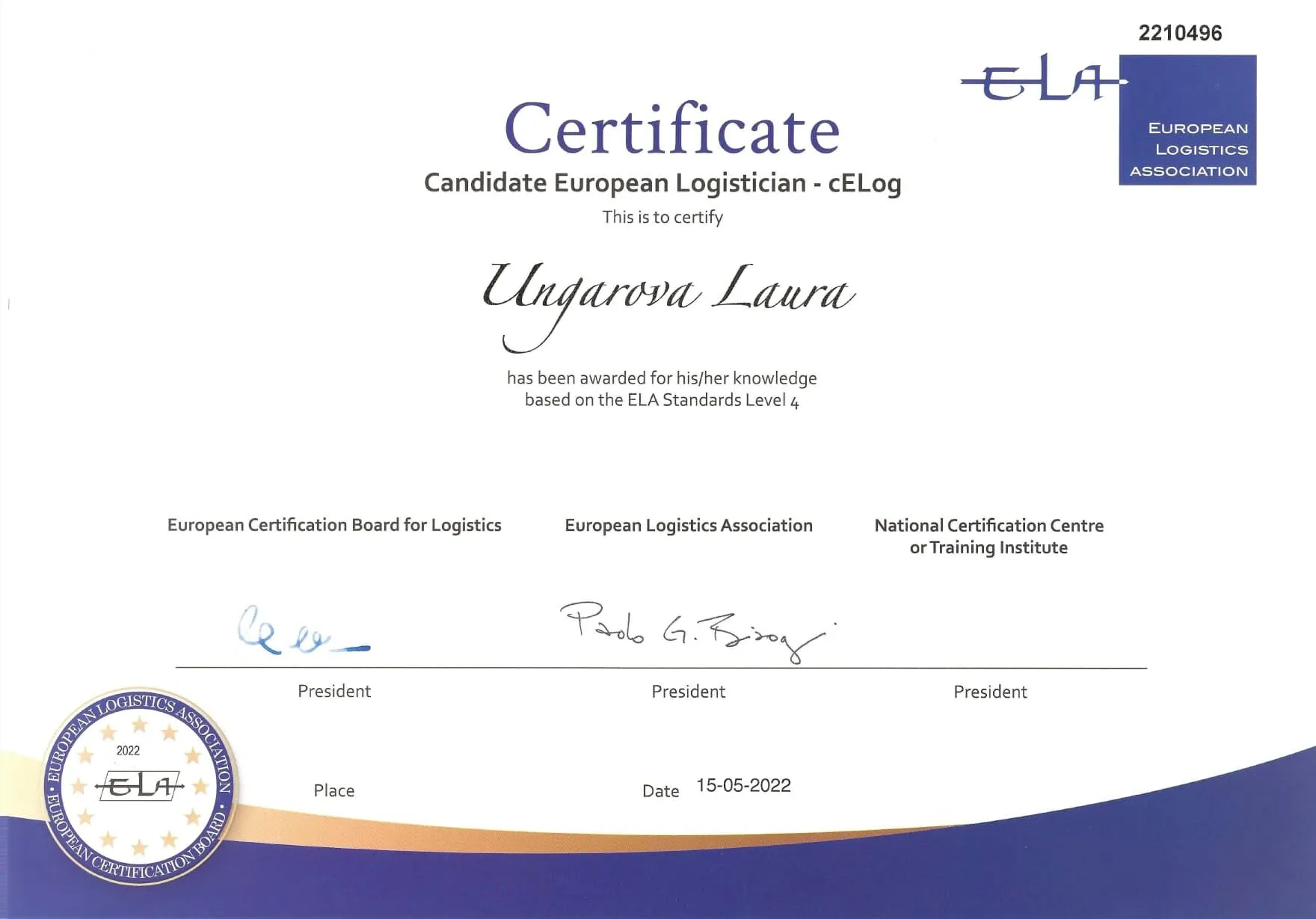
Bachelor of Economics and Business with a degree in Logistics can carry out analytical, research, organizational and managerial (administrative) and educational (pedagogical) activities in the following areas: management of logistics processes in procurement and distribution; transportation; logistic risk management; warehousing and cargo handling; Inventory Management; information and computer support for logistics; administration of logistics systems.
The professional activity of a logistician is carried out in the field of material production, commodity circulation, and the service sector and is aimed at ensuring the functioning of enterprises of all legal forms in order to rationally organize logistics activities taking into account the industry, regional and assortment specifics of the enterprise.
- material flows and resources (commodity, financial, personnel);
- intangible flows and resources (information, temporary, service);
- distribution systems;
- production and marketing systems;
- information support systems for production, supply, distribution, transport and technological processes.
By analogy with the European “Standards of Competencies”, in the framework of the educational program of the Republic of Kazakhstan, a bachelor in the specialty “Logistics” refers to the operational level.
The specialist in the operational stage should know the basics of logistics and supply chain management: transportation, customs formalities, warehousing, information technology, understand the logistics strategies and processes, the relationship between the logistics systems and within them (general knowledge), and also know the general principles of the software for Warehousing and accounting.
- coordination in the delivery process and selection of the best option;
- storage and shipment of goods;
- process control;
- preparation of primary documentation, its systematization and the formation of registers;
- formation and placement of finished orders;
- preparation and submission of documents to the licensing authorities;
- control and coordination of the warehouse, as well as the transport service;
- forecasting optimal purchases;
- cargo routing.
- organization and design of logistics systems;
- planning of the logistics process at enterprises of various sectors of the economy;
- optimization of enterprise resources associated with the management of material and associated flows;
- management of the logistics process in procurement, production and distribution;
- cross-functional and inter-organizational logistics coordination;
- management of the main logistic functions: orders, stocks, transportation, warehousing and cargo handling, packaging, service;
- information support for the functioning of logistics systems;
- administration of logistics systems: controlling and audit;
- formation of global logistics systems and international logistics;
- design and management of macro-logical systems.
In accordance with the high requirements for the competence of modern specialists, a graduate in the specialty “Logistics” should have the following key competencies:
Universal (general) competencies:
- general scientific;
- instrumental;
- social and personal;
- general cultural;
Subject-specific (professional) competencies:
- general professional;
- profile and special.
- European Logistics Association (ELA)
The European Logistics Association (ELA) was established in 1984 in Switzerland by eleven logistics operators from 7 European countries. The decision to create an association was a natural consequence of the recognition of the key role of logistics in ensuring the competitive advantages of the business. Today, ELA is an internationally recognized platform for the exchange of ideas and experience for one hundred thousand European logistics professionals. The Group includes 30 national logistics associations of Central and Eastern European countries, including Kazakhstan. ELA is engaged in the development of pan-European logistics standards, training and awarding the qualification of a professional logistician, organizing professional conferences and seminars. The Association is working to standardize terminology in all European languages. - Shyngar Trans LLP, branch of the Department
It is the official forwarder of JSC “NC Kazakhstan Temir Zholy” and the owner of the rolling stock. Shyngar Trans was founded in August 2007. At the moment, thanks to the huge work done, providing a full range of services, the company is one of the leaders in the cargo transportation market. - 1C-Sapa Company
The Slava KVTS company was founded in October 1997 – and this is more than 20 years of unique experience working with clients and 1C software solutions!
The staff of “Slava KVTS Company” includes specialists certified by 1C for high-quality support and implementation of programs of the 1C Company line, with more than 15 years of experience. - Kazakhstan Logistics Cluster (KLC) Institution
KLC certification laboratory is organized at the Department of Marketing and Logistics
A feature of this program is the ability to take certified courses in logistics in the Kazakhstan logistics cluster.
Advantages of the educational program “Logistics”:
- The use of interactive teaching methods (interactive lectures, case studies, role and business games, presentations, business projects);
- Practice-oriented training (master classes, guest and binary lectures with the invitation of practitioners, field classes in commercial structures);
- The use of computer technology (online testing on the kahoot.it website, conducting online classes based on Adobe connect software, solving applied optimization problems and conducting a business game in the Excel program, computer testing using the econom and U-3 testing programs );
- In-depth study of the English language with the receipt of an appropriate certificate;
- Passing industrial and undergraduate practice in leading companies;
- Harmonization of the curriculum of the specialty “Logistics” with the educational programs of foreign universities for the implementation of double-degree education programs.
- Traffic logistics group LLP
- TLC Global Trade
- TLC “Lomer Point Bridge”
- Russian University of Economics Plekhanova
- International Business Academy ID-GROUP
- LBK – Latvian Business College
- The Pennsylvania State University, College of Agricultural Science (Pennsylvania, USA).
- University of Applied Sciences Zittau / Goerlitz (Zittau / Goerlitz, Germany).
- Budapest Metropolitan University (Budapest, Hungary).
- WSG University of Economy in Bydgoszcz (Bydgoszcz, Poland)
- Siauliai University (Šiauliai, Lithuania).
- Baltic International Academy (Riga, Latvia).
- Varna University of Economics (Varna, Bulgaria).
- Moscow Financial and Industrial University “Synergy” (Russia).
- Kyrgyz Economic University. M. Ryskulbekova (Bishkek, Kyrgyz Republic).
- Grodno State University. Y. Kupaly, Grodno, Republic of Belarus
- Krasnoyarsk State Agrarian University, Krasnoyarsk, Russia
- Lodz University of Technology (Lodz, Poland)
- Altai State University (Barnaul)
In logistics, career levels of specialist, leading specialist, manager, department head and logistics director are distinguished. A young logistics specialist can find a job already while studying, having completed practice at the simplest stages, for example, in a warehouse, in the transport departments of companies. Many large companies are happy to accept our students for internships for further development within the company. The crown of a logistics career is the Director of Logistics. He is involved in developing the company’s strategy, is responsible for managing huge flows and resources, and is a member of the Board of Directors.
Graduates with a degree in Logistics can independently engage in business, since the creation of their own logistics company is quite common in this area. Such a company provides services in the field of transportation, warehousing, procurement management, participates in the development of logistics IT solutions for other companies. Of course, this will require additional training, but deep mastery of professional skills and competencies is a key factor in a successful career in this field of activity. The fact that logistics is the connecting link between all levels of the company allows the logistician, as he moves up the career ladder, to interact with most departments, to understand their work and place in the corporate governance system. Such an experience, together with an active lifestyle and the desire to succeed, can become the basis of a good career.

